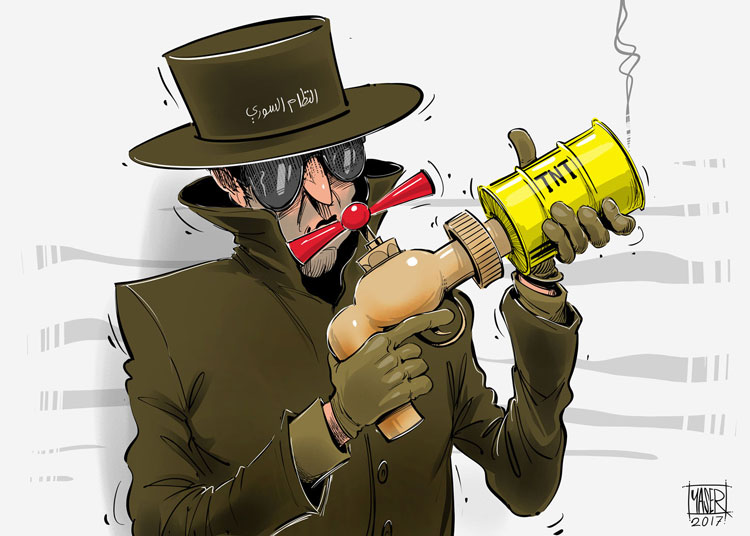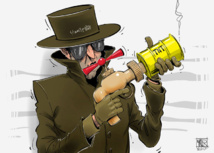Making matters worse, doctors say there is a systematic campaign of intimidation being carried out by the Syrian government against people with intimate knowledge of what happened in Douma on the night of April 7.
"The medics and their families who are still in Douma and did not leave with the others to northern Syria are under very close supervision by the regime and their allies," said Ghanem Tayara, the chairman of Union of Medical Care and Relief Organizations (UOSSM), a charity operating in rebel-held areas of Syria.
Tens of thousands of people left Eastern Ghouta, the last rebel-held enclave outside Damascus, as the rebels ceded in the face of a sustained military campaign by government forces this year and a three-year siege before that.
The government's alleged chemical weapons strike sealed the fate of Douma, the last opposition-run neighbourhood standing. Bus upon bus had transported residents to the north of Syria, where the rebels and Turkey control territory.
Tayara said some of the alleged victims of the attack who chose not to be displaced have been taken by the government of President Bashar al-Assad to areas outside Douma, where they can be kept under surveillance.
Medics who could testify to international experts are feeling the pressure more directly, having received threats to themselves and their families.
"The pressure has increased on the doctors and nurses who are still in Douma in the past few days," Tayara said.
Tasked with investigating the alleged attack, experts from the Organisation for the Prohibition of Chemical Weapons (OPCW) have been in Syria for more than a week but they have not been able to access Douma.
In the meantime, Western powers convinced a chemical weapons attack was perpetrated by al-Assad launched a series of military strikes against Syrian government targets said to be connected to its chemical weapons programme.
The Syrian government and its Russian backers have offered the OPCW a specific 22 people it would be allowed to interview, off site. Ahmet Uzumcu, the head of the OPCW, has insisted the experts be allowed to visit the scene, but security concerns have prevented entry thus far.
However, the Syrian government has let friendly, partisan media outlets walk into Douma and report. Perhaps not surprisingly, none have found anyone willing to say there was a chemical weapons attack, or, in fact, say anything bad at all about the Syrian government.
"Those poor people inside Douma have no choice but to say so," said Muyyaid, a photographer who was in the area at the time of the attack and is now in northern Syria. He asked that his family name not be used.
He remembers the night vividly and says he remains haunted by what he saw. He filmed the events as best he could. Like others, he slipped what he says is evidence out of the enclave so that experts could review the findings.
"I am ready to speak to all to tell them of the horrors we saw on that night," he says by telephone.
Some people have snuck out clothing that they say was exposed to chlorine bombs and possibly other prohibited weapons. But the most damning evidence, according to opposition activists, remains in Douma itself.
As time passes and the Syrian government is able to assert more control over Douma, rescue workers fear the burial grounds of the alleged victims will be tampered with and other evidence eliminated.
"We informed the OPCW about the location of the site where victims of the chemical attack were buried," said Raed al Saleh, the head of the rescue group known as the White Helmets, which operates in rebel-held Syria.
"We hope that the Syrian regime and Russia will allow the inspectors to enter Douma. We fear that the regime and Russia may move the bodies of victims and tamper or hide the evidence," al Saleh said in a statement on Friday.
US academic Steven Heydemann at Smith College, an expert on Syria, doubts there is much point left in the OPCW trying to visit the scene.
"The UN should indicate that it no longer has confidence in the integrity of the site and withdraw. To investigate now is a to participate in a regime charade," he said.
--------------------------------------------------------------------------------------------------------------------------------
"The medics and their families who are still in Douma and did not leave with the others to northern Syria are under very close supervision by the regime and their allies," said Ghanem Tayara, the chairman of Union of Medical Care and Relief Organizations (UOSSM), a charity operating in rebel-held areas of Syria.
Tens of thousands of people left Eastern Ghouta, the last rebel-held enclave outside Damascus, as the rebels ceded in the face of a sustained military campaign by government forces this year and a three-year siege before that.
The government's alleged chemical weapons strike sealed the fate of Douma, the last opposition-run neighbourhood standing. Bus upon bus had transported residents to the north of Syria, where the rebels and Turkey control territory.
Tayara said some of the alleged victims of the attack who chose not to be displaced have been taken by the government of President Bashar al-Assad to areas outside Douma, where they can be kept under surveillance.
Medics who could testify to international experts are feeling the pressure more directly, having received threats to themselves and their families.
"The pressure has increased on the doctors and nurses who are still in Douma in the past few days," Tayara said.
Tasked with investigating the alleged attack, experts from the Organisation for the Prohibition of Chemical Weapons (OPCW) have been in Syria for more than a week but they have not been able to access Douma.
In the meantime, Western powers convinced a chemical weapons attack was perpetrated by al-Assad launched a series of military strikes against Syrian government targets said to be connected to its chemical weapons programme.
The Syrian government and its Russian backers have offered the OPCW a specific 22 people it would be allowed to interview, off site. Ahmet Uzumcu, the head of the OPCW, has insisted the experts be allowed to visit the scene, but security concerns have prevented entry thus far.
However, the Syrian government has let friendly, partisan media outlets walk into Douma and report. Perhaps not surprisingly, none have found anyone willing to say there was a chemical weapons attack, or, in fact, say anything bad at all about the Syrian government.
"Those poor people inside Douma have no choice but to say so," said Muyyaid, a photographer who was in the area at the time of the attack and is now in northern Syria. He asked that his family name not be used.
He remembers the night vividly and says he remains haunted by what he saw. He filmed the events as best he could. Like others, he slipped what he says is evidence out of the enclave so that experts could review the findings.
"I am ready to speak to all to tell them of the horrors we saw on that night," he says by telephone.
Some people have snuck out clothing that they say was exposed to chlorine bombs and possibly other prohibited weapons. But the most damning evidence, according to opposition activists, remains in Douma itself.
As time passes and the Syrian government is able to assert more control over Douma, rescue workers fear the burial grounds of the alleged victims will be tampered with and other evidence eliminated.
"We informed the OPCW about the location of the site where victims of the chemical attack were buried," said Raed al Saleh, the head of the rescue group known as the White Helmets, which operates in rebel-held Syria.
"We hope that the Syrian regime and Russia will allow the inspectors to enter Douma. We fear that the regime and Russia may move the bodies of victims and tamper or hide the evidence," al Saleh said in a statement on Friday.
US academic Steven Heydemann at Smith College, an expert on Syria, doubts there is much point left in the OPCW trying to visit the scene.
"The UN should indicate that it no longer has confidence in the integrity of the site and withdraw. To investigate now is a to participate in a regime charade," he said.
--------------------------------------------------------------------------------------------------------------------------------









 Home
Home Politics
Politics











